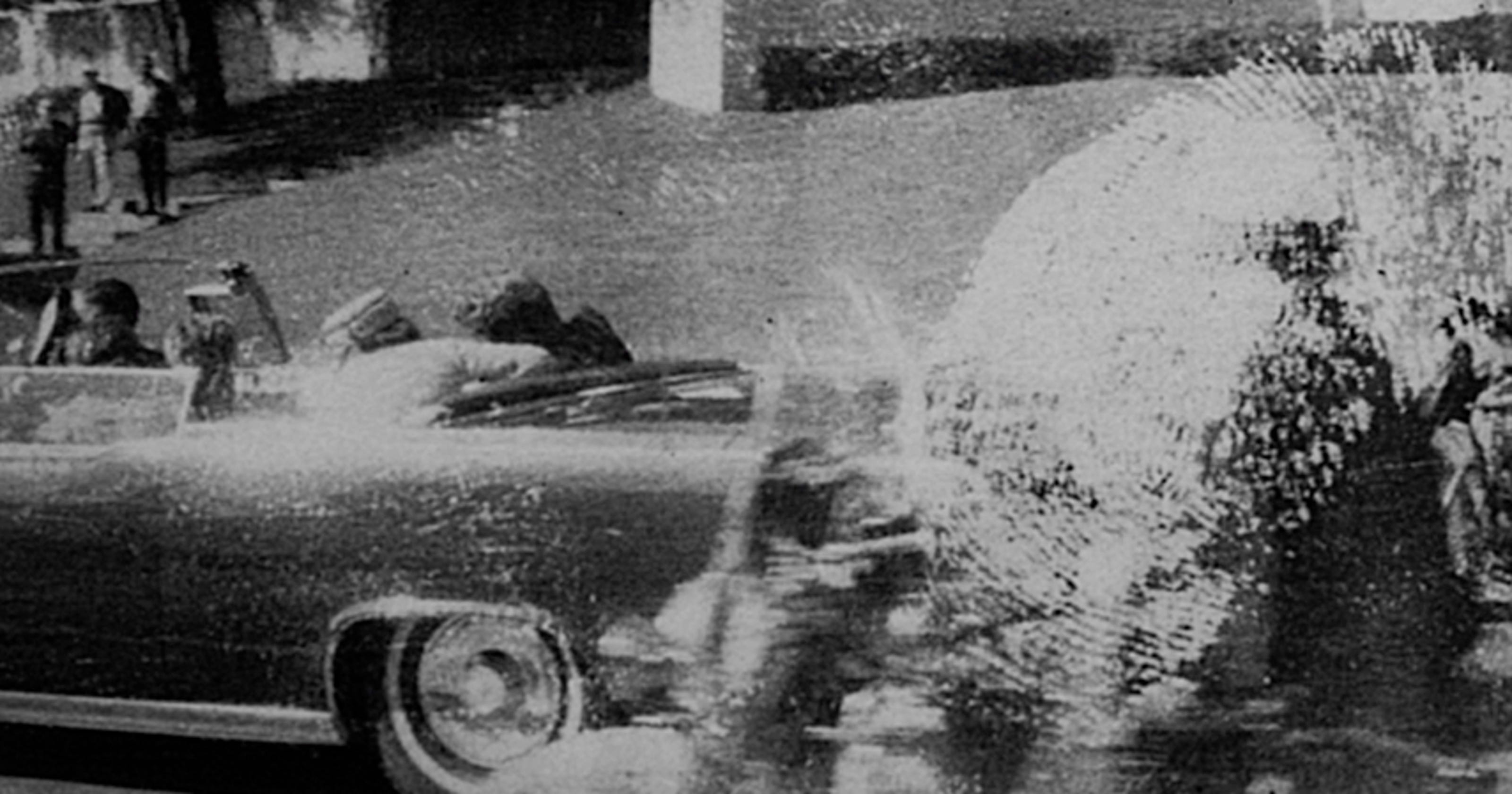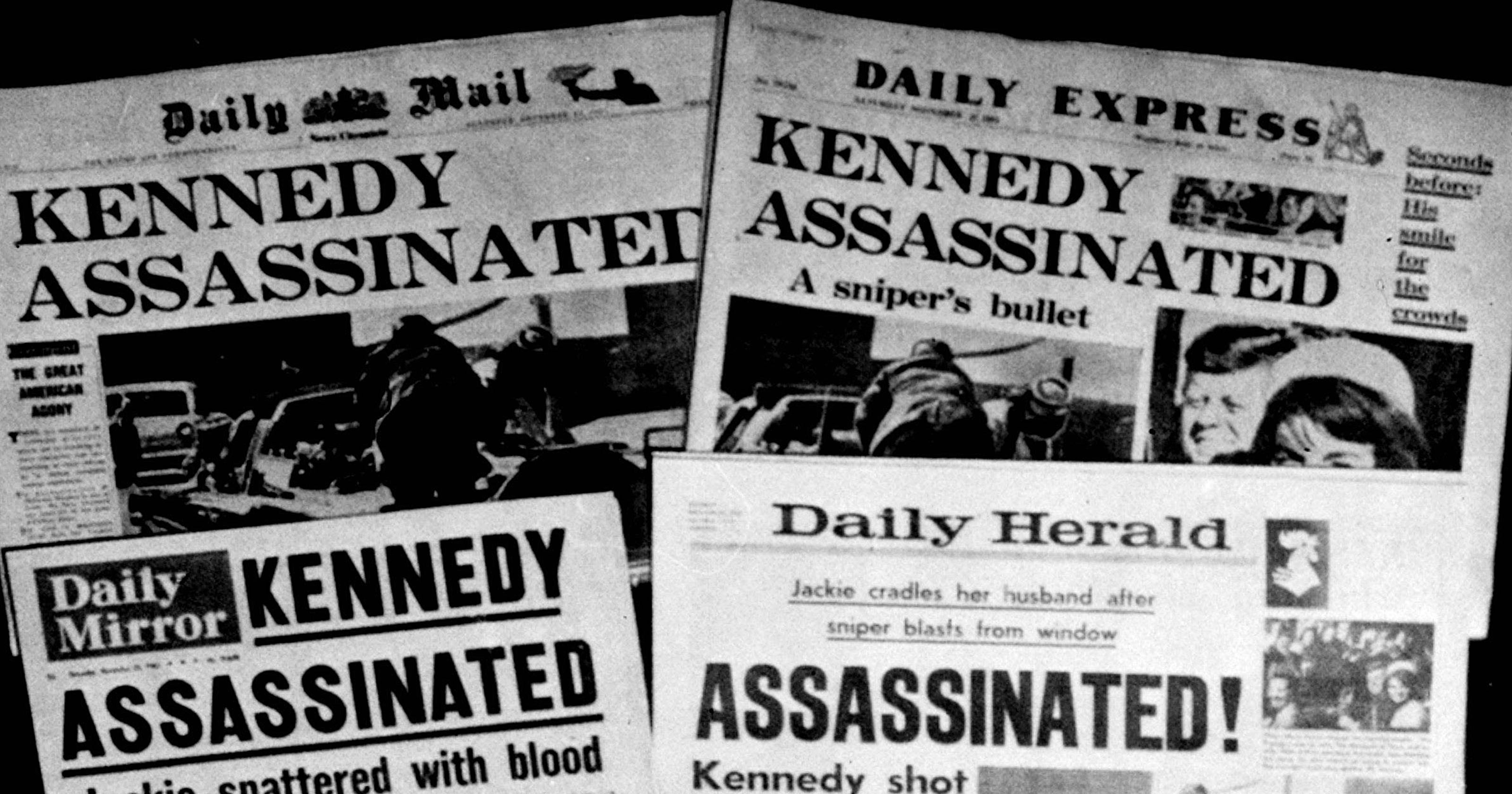Understanding The **Kennedy Assassination Date**: A Look Back At A Pivotal Moment
Detail Author:
- Name : Mr. Vicente Franecki
- Username : bart59
- Email : ceasar.crona@yahoo.com
- Birthdate : 1986-07-16
- Address : 76136 Jeremy Heights Suite 450 New Jesusside, AR 54506-8409
- Phone : 616.534.7503
- Company : Goyette-Hansen
- Job : Waitress
- Bio : Molestiae voluptatem perferendis ducimus ut tempore ex nesciunt. Beatae velit quia sapiente voluptate doloribus enim. Labore recusandae quo quia. Et dolor voluptatum eveniet.
Socials
linkedin:
- url : https://linkedin.com/in/feesto
- username : feesto
- bio : Placeat et excepturi ab voluptatem qui dolorum.
- followers : 1357
- following : 1818
facebook:
- url : https://facebook.com/ona7494
- username : ona7494
- bio : Corrupti consequuntur quasi eaque molestiae ex.
- followers : 5953
- following : 309
instagram:
- url : https://instagram.com/feest1989
- username : feest1989
- bio : Rerum sit sit earum. Reprehenderit eius et enim iste aperiam.
- followers : 2815
- following : 1042
The day John F. Kennedy's life ended, the kennedy assassination date, really changed things for a lot of people. It was a moment that, you know, stopped the world in a way, and many still remember where they were when they heard the news. This particular date, November 22, 1963, became a very, very significant part of American history, leaving a mark on the country's collective memory.
For those who lived through it, the sudden passing of a young, energetic president was, quite simply, a shock. It's a date that, you know, gets talked about in history classes and family stories, often with a sense of disbelief and sadness. The event, frankly, reshaped political discussions and how people viewed their leaders for years afterward.
So, understanding the kennedy assassination date means more than just knowing a number on a calendar. It means looking at the person involved, his time in office, and the immediate aftermath that, as a matter of fact, left a lasting impact on the nation. We will, in fact, explore the key details surrounding this moment, making sure to share what we know about John F. Kennedy's journey and the day his presidency ended.
Table of Contents
- JFK: A Life in Public Service
- Personal Details and Bio Data
- The Fateful Day: November 22, 1963
- The Impact of the Kennedy Assassination Date
- Common Questions About the Kennedy Assassination Date
JFK: A Life in Public Service
John F. Kennedy's path to the presidency was, you know, quite a journey, full of interesting stops along the way. He came from a family, the Kennedys, where public service was, apparently, a big deal. His mother, Rose Fitzgerald Kennedy, was a very disciplined and organized woman, who, in fact, kept careful records, even noting the birth of her second child on a notecard.
He got his schooling at Harvard, finishing up in 1936. After that, he served in the U.S. Navy, becoming a lieutenant. His time during the war, you know, really showed his courage and, arguably, made him a hero to many. This experience, in a way, set him up for what came next in his life.
Following his military service, Kennedy, basically, tried his hand at being a journalist for a bit. That was a short stop, though, before he jumped into the world of politics. He served in the U.S. House of Representatives, representing his district from 1947 to 1953. After that, he moved on to the U.S. Senate, continuing his work for the public.
Then, in January 1961, John F. Kennedy, at the age of 43, took the oath of office. He became one of the youngest U.S. Presidents ever, and, quite significantly, the first Roman Catholic to hold that high position. His presidency, you know, started with a lot of hope and energy, and he was hardly past his first thousand days in office when, sadly, his vibrant presidency was cut short by an assassin's bullet.
He was president from 1961 to 1963, a relatively short period, but one that, you know, left a big impression. His time in office was, in some respects, just getting started, with many plans and ideas still unfolding. The fact that his term ended so suddenly, on that specific kennedy assassination date, makes people think about what might have been.
Personal Details and Bio Data
| Full Name | John Fitzgerald Kennedy |
| Born | May 29, 1917 |
| Died | November 22, 1963 |
| Place of Birth | Brookline, Massachusetts |
| Place of Death | Dallas, Texas |
| Spouse | Jacqueline Lee Bouvier |
| Children | Caroline, John Jr., Patrick (deceased in infancy), Arabella (stillborn) |
| Education | Harvard University |
| Military Service | United States Navy (Lieutenant) |
| Political Party | Democratic |
| Presidential Term | 1961-1963 |
The Fateful Day: November 22, 1963
The kennedy assassination date, November 22, 1963, is a day that, you know, remains etched in history for its sudden and tragic events. On that particular Friday, President Kennedy was in Dallas, Texas, riding in a motorcade with his wife, Jacqueline, and Governor John Connally of Texas. They were, in fact, waving to crowds that had gathered to see them.
The motorcade was moving through Dealey Plaza when, basically, shots were fired. The president was hit, and the scene quickly turned from a public appearance to one of chaos and disbelief. The immediate moments after the shots were, naturally, filled with confusion and fear, as people tried to figure out what had just happened.
News of the shooting, you know, spread incredibly fast across the country and around the world. People tuned into their radios and televisions, trying to get any information they could. The news was, in a way, almost too much to take in for many. It was a day when, as a matter of fact, normal life seemed to pause as everyone waited for updates.
John F. Kennedy was taken to Parkland Memorial Hospital, but the injuries were, sadly, too severe. He was pronounced gone at 1:00 PM Central Standard Time. This moment, the official announcement of his passing, really solidified the kennedy assassination date as a day of national mourning. It was, in some respects, a moment when the country felt a deep, collective sorrow.
The events of that day, from the motorcade to the hospital, are, apparently, studied and discussed by historians and the public even now. The swiftness of it all, how a president's life could be cut short so suddenly, left a lasting impression. It's a day that, you know, continues to be examined, with every detail, every moment, holding a certain weight.
The immediate aftermath saw a rapid change in leadership, with Vice President Lyndon B. Johnson taking the oath of office on Air Force One, just hours after Kennedy's passing. This quick transition, you know, showed the resilience of the government, even in such a shocking situation. The country, basically, had to move forward, even with a heavy heart.
For many, the kennedy assassination date is not just a historical event but a personal memory, a moment when, you know, the world seemed to shift. It's a date that, quite honestly, brings up strong feelings and thoughts about the past. The day, in fact, stands as a stark reminder of how quickly things can change, and how deeply a single event can affect a nation.
The Impact of the Kennedy Assassination Date
The impact of the kennedy assassination date, November 22, 1963, was, in some respects, immense, changing the course of American history. Kennedy's presidency, which started in January 1961, was, you know, full of promise and new ideas. He was a young leader, just 43 when he took office, and he had, frankly, a lot of plans for the country.
His time in office, though short, saw a lot of movement on different issues, both at home and abroad. He was, apparently, working on things like civil rights and space exploration. The sudden end to his time as president, on that specific date, left many of these efforts unfinished, or, you know, in a state of uncertainty.
The country, after the kennedy assassination date, went through a period of deep reflection and sadness. People felt a profound loss, not just for a leader, but for what he represented. His passing, in a way, created a void that, you know, took time to process. The public, basically, grappled with the idea that such a vibrant figure could be gone so quickly.
The events of that day, and the investigations that followed, also, you know, led to a lot of public discussion and debate. The questions surrounding the assassination, and who was responsible, have, frankly, continued for decades. This ongoing discussion, in some respects, highlights how deeply the event affected people's trust and understanding of major events.
The legacy of John F. Kennedy, even with his short time in office, has, you know, continued to influence American politics and culture. His speeches, his vision, and his call for public service are, apparently, still remembered and studied. The kennedy assassination date, in a way, cemented his place in history, making his life and work even more poignant.
The memory of that day, November 22, 1963, serves as a reminder of a pivotal moment when, you know, the nation faced a profound challenge. It's a date that, quite simply, signifies a turning point, marking the end of one era and the beginning of another. The impact, you know, continues to be felt in how we remember history and how we talk about leadership.
People often wonder about the details of that day, about the sequence of events and the individuals involved. The sheer weight of the moment, the sudden loss of a president, meant that the kennedy assassination date became, basically, a shared experience for millions. It's a day that, you know, continues to spark interest and, honestly, a desire to understand what happened.
Learn more about John F. Kennedy's life and times on our site, and link to this page for more historical context. For additional details on the historical significance of the event, you could, for instance, look at resources like the National Archives, which keeps many records related to this period. The National Archives has a lot of information, naturally, for those who want to dig deeper.
Common Questions About the Kennedy Assassination Date
When exactly was the kennedy assassination date?
The kennedy assassination date was November 22, 1963. This was the day, you know, when President John F. Kennedy was shot while riding in a motorcade in Dallas, Texas. It was a Friday, and the news, basically, spread very quickly across the country, affecting many people.
Who was president right after the kennedy assassination date?
Lyndon B. Johnson, who was the Vice President, took over as president right after the kennedy assassination date. He was sworn into office, you know, on Air Force One, just hours after Kennedy's passing. This was a very quick transition, naturally, to ensure the government kept running.
Why is the kennedy assassination date so important in history?
The kennedy assassination date is very important because it marked the sudden end of a young president's life and presidency. John F. Kennedy was seen as a symbol of hope and change, and his passing, you know, deeply affected the nation. It led to, frankly, a lot of questions and changed the mood of the country for a long time.

Remembering RFK, 50 years later

Historic Kennedy assassination photo to be auctioned

How the NFL played on after Kennedy's assassination